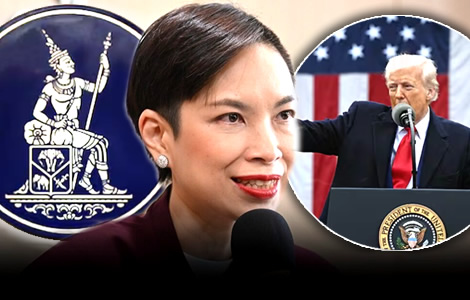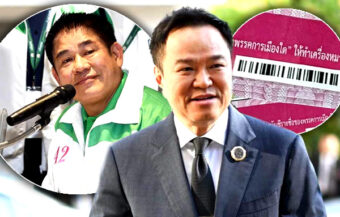Trump’s tariffs are back—and Thailand’s running out of time. A Bank of Thailand official warns of serious 2025 risks as talks with Washington stall. With rivals racing ahead, Bangkok faces export losses, uncertainty and rising pressure from the U.S.
A senior official at the Bank of Thailand on Friday urged caution and called for all economic stakeholders to be prepared. Chayawadee Chai-Anant warned that Trump’s retaliatory tariffs still pose a serious threat to Thailand later in 2025. Her comments followed stronger-than-expected economic data for April. However, some analysts in Bangkok voiced concern over Thailand’s failure to advance trade talks with the United States. They warned the government not to become complacent after a U.S. federal court in Manhattan temporarily blocked Trump’s sweeping tariff plan on Thursday. Less than 24 hours later, an appeals court reinstated the tariffs — a move that underlined the continuing risk.

Thailand’s economy showed solid growth in April, driven by private and public investment, tourism, and a rebound in merchandise exports. However, the Bank of Thailand is worried. Assistant Governor Chayawadee Chai-Anant warned that US tariffs pose a serious downside risk. She noted that growth momentum may not be sustained if external headwinds intensify. With Trump’s tariff threat hanging over Thailand, the central bank has begun sounding the alarm.
The senior bank official also supported the government’s decision midweek to shelve for now a ฿157 billion public stimulus package. Instead, the money will be used to support industry hit by the US trade barriers.
Exports driven by gold but weak across other sectors as the Bank of Thailand urges caution on the outlook
She even noted marginal improvement in the foreign tourism trend. However, the country racked up a trade deficit of $1.5 billion in April. At the same time, private consumption fell by 1.5%. In contrast, the bank noted a 2.9% rise in private investment.
Exports were up by nearly 10% from last year, although very much dependent on gold output. Even industrial output rose marginally.
The top bank executive signalled the next Monetary Policy Committee review will provide a clearer picture of the Thai economy. For now, there remains a high level of uncertainty, volatility and a need for caution.
In the meantime, Donald Trump is charging ahead with a renewed push for punitive trade measures. His plan have rattled Asian economies — and Thailand is near the top of his list.
Although a US federal court recently blocked most of his sweeping April 2 import tariffs, the ruling offered only temporary protection. Legal experts agree Trump still has multiple options. He remains determined to slash the trade deficit — and Thailand remains exposed.
Indeed, the tariffs continue to be collected by U.S. Customs and Border Protection as the case snakes its way ultimately to the Supreme Court.
Trump’s original tariffs relied on the International Emergency Economic Powers Act. However, a federal judge ruled that he exceeded his authority. The U.S. Court of International Trade in Manhattan issued that ruling on May 28, providing limited relief. Still, analysts were right to caution that any respite would be short-lived.
Hours later, the Court of Appeal reaffirmed the Trump reciprocal tariff regime.
Trump still has the power to impose tariffs as Thailand falls behind rivals in engaging Washington on trade
Importantly, Trump retains authority under Section 232 of the Trade Expansion Act of 1962. That law lets presidents impose tariffs for national security. It has already been used once — and remains legally intact. So even if one legal route is closed, another remains wide open.
In Bangkok, officials are downplaying the danger. Prime Minister Paetongtarn Shinawatra insists informal talks with Washington are “constructive.” Yet there’s no evidence of progress. So far, Thailand has not held a single in-person meeting with US trade officials. Meanwhile, Vietnam, Malaysia, and even Indonesia have moved fast to open dialogue.
Thailand was granted a 90-day grace period in early April. But that window is already half gone. So far, the government has little to show. Worse, US officials skipped Thailand’s flagship ASEAN-US Investment Forum in May. No one came. Not even a video greeting was sent. The message was clear: Washington isn’t impressed by symbolic overtures.
Deputy Prime Minister Pichai Chunhavajira has cancelled two scheduled trips to Washington. Those visits were expected to jumpstart negotiations. Instead, they were quietly shelved. Observers say this signals hesitation — and could be seen in the US as a snub.
Deportation of Uyghurs and Paul Chambers case has worsened Thai-US relations under the surface
At the same time, bilateral tensions have increased. The forced deportation of Uyghur refugees on 27 February triggered outrage in the US State Department. Washington views such deportations as severe human rights violations. Diplomatic relations cooled swiftly afterwards.
Additionally, American academic Paul Chambers was pushed out of Thailand this month. He had lived and worked in the country for more than 30 years. After facing legal threats and a court case — later dropped — he left due to visa issues. Nonetheless, the US viewed the case as an attack on academic freedom.
Quiet visa restrictions were reportedly imposed on some Thai officials.
Despite these frictions, Thailand continues to project calm. Vice Foreign Minister Russ Jalichandra claims relations with Washington remain warm. He argues that Thailand is viewed as a partner, not a rival. But the signals suggest otherwise.
Thailand has a consistent trade surplus with the US. It exports large volumes of electronics, auto parts, and machinery — many of which compete directly with Vietnamese and Malaysian goods. Both of those countries are now actively offering major concessions to reduce their surpluses. Thailand, in contrast, has made limited and vague written submissions.
Bangkok’s optimism about US court ruling is misguided as Trump eyes new legal paths to impose tariffs
Some officials in Bangkok appeared to believe the US court ruling neutralised Trump’s plan. Yet that view is dangerously optimistic. Even if the blocked tariffs had to be abandoned, Trump can issue fresh ones under new legal grounds. His team is already preparing alternatives.
Washington insiders say Section 232 is just one option. Trump could also invoke anti-dumping laws or other executive trade powers. His campaign remains laser-focused on reducing deficits — especially with Southeast Asian countries.
Thailand’s current tariff designation stands at 36%. That’s higher than Malaysia’s 24%, but below Vietnam’s 46%. These rankings matter. Countries that act quickly could secure exemptions. Those that delay risk higher penalties — or being cut out altogether.
Meanwhile, the US has already completed a fast-track trade agreement with the United Kingdom. Other talks are progressing, though slowly. One reason: Washington hasn’t clearly defined what it wants. Officials have not stated how much they want to reduce deficits, or what they expect in return. This ambiguity has stalled progress across multiple fronts.
Thailand risks being left behind as Vietnam and Malaysia race to offer trade concessions to the US
Even so, other countries are adapting fast. Malaysia and Vietnam are holding face-to-face meetings with top US officials. Both are trying to avoid sweeping penalties. Thailand, however, is standing still. Its officials cite “informal dialogue,” but no firm proposals have been made.
That’s a major risk. Economists warn that now is the best time for Thailand to act. Trump is presently restrained by legal challenges, but those won’t last. Engaging now could secure better terms. Waiting may leave Thailand with no leverage.
Adding to the problem is the view in Bangkok that closer ties with China could offset any US damage. But this approach may backfire. Many Thai exports to the US are actually Chinese goods rerouted through Thai factories. Closer ties with China could increase scrutiny, not reduce it.
Washington is watching these trends closely. So are Thailand’s rivals. Manufacturing hubs in Vietnam and the Philippines are working to appear cooperative. Their goal is to lure new US investment. If Thailand falls behind, it could lose billions in export revenue and jobs.
Thailand faces a tough decision on trade strategy as Trump tariffs are likely to be applied one way or another
Thailand must choose a path: engage now or suffer later. Legal experts in Washington say Trump’s appeal will likely succeed. The tariffs are presently being applied. But they also expect his team to shift gears immediately if they are struck down. New tariffs could arrive overnight under different statutes.
The risk isn’t just economic — it’s strategic. Trump wants quick results. He has legal tools. He was re-elected with a strong mandate. Countries that stay silent now may face harsher treatment in the next wave.
Prime Minister orders government trade talks team to review US court order striking down Trump tariffs
Commerce Minister meets US trade boss Jamieson Greer in Korea. Paul Chambers case still dogs talks
Top economist warns Thailand must get talks going with the United States after US-China 90-day pause is unveiled
Already, Bank of Thailand officials are voicing concern. Assistant Governor Chayawadee Chai-Anant said the economy remains healthy, but uncertainty is rising. Export growth has returned, but external risks — especially tariffs — could derail the recovery. She confirmed the issue will be front and centre at the central bank’s June policy meeting.
In short, the clock is ticking. The United States won’t wait forever. Trump’s team wants action — not ambiguity. Thailand has just weeks left to shape the outcome. Failure to act may cost the country far more than it realises.
Join the Thai News forum, follow Thai Examiner on Facebook here
Receive all our stories as they come out on Telegram here
Follow Thai Examiner here
Further reading:
Commerce Minister meets US trade boss Jamieson Greer in Korea. Paul Chambers case still dogs talks


















